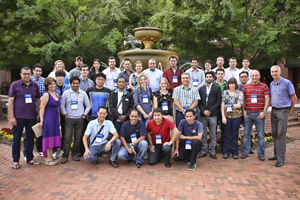Aviagen celebrates 50th Production Management School

Poultry production management personnel from 20 countries are gathering in Huntsville, Alabama, for the 50th Production Management School, hosted by poultry breeding company Aviagen.
The month-long school offers Aviagen customers a chance to gain hands-on experience with virtually every facet of poultry production. More than 1,500 poultry professionals from 62 countries have completed the program since 1967, when it was founded in Connecticut as the Arbor Acres Production Management School.
The 2013 school curriculum will feature 17 field trips and workshops focusing on fertility, ventilation, gut health, feed formulation, and much more. Classes and hands-on sessions will be taught by 50 instructors and experts, from Aviagen employees to professors from local and international universities.
“For the 50th time, the best and brightest people in the poultry industry will gather to immerse themselves in the latest science and best practices that define the finest in poultry production management,” said Randall Ennis, CEO at Aviagen. “While the content taught in the Aviagen Production Management School has evolved considerably since 1967, the goal remains the same: to ensure that every graduate returns home with a firm, end-to-end understanding of broiler breeding and the vital issues that surround it, from best production practices to animal welfare and biosecurity.”
When the inaugural class graduated in 1967, the broiler breeding industry was concentrated in Connecticut. Jet transportation was becoming widespread, and with it came an opportunity for poultry innovators like Arbor Acres to introduce their brands and products into new markets. But the company realized that for globalisation to be successful, the same standards and best practices employed in the United States must be followed worldwide. The Arbor Acres Production Management School was born.
In the early years, students from all over the world would live at the school for up to three months. Students would spend half their day in the classroom and the other half learning what it takes to breed broilers, to clean poultry houses and select birds, and to handle and sanitize eggs.
In addition to teaching best practices, the school created networks of colleagues who not only transferred their knowledge to one another, but they also took that knowledge back home. In the process, they helped shape the future of the industry.








